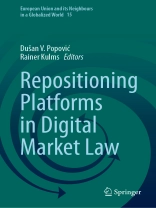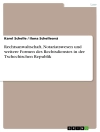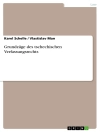Online platforms and their ecosystems are the cornerstone of the digital economy. They have brought forth positive network effects. But they are also known for their information asymmetries, their potential for market failures and their problematic relationship with data protection law. This volume provides a detailed analysis of the current process of repositioning online platforms in the digital economy as regulators express concerns about the evolution from mere intermediaries to gatekeepers. The exclusive reliance on competition law instruments has proven to be incapable of coping with cases of platforms abusing their market power. Therefore, the book explores the European Union’s new approach to digital markets consisting in the adoption or drafting of new legislative instruments, such as the Digital Markets Act, Digital Services Act, Proposal of AI Act, Proposal of Data Act, Proposal of Data Governance Act. The EU’s emphasis on new regulatory ex ante instruments (as in the Digital Markets Act) calls for an assessment of their overlap or their interface with existing supranational and national competition rules.
The book transcends mere competition law thinking by exploring the status of online platforms from the perspective of trade law rules, unfair competition law, data protection rules and intellectual property law. But in view of the global reach of online platforms, the risks of a jurisdiction-wise approach with conflicting regulatory strategies are all too clear. The volume therefore includes comparative studies on Australia and the USA. The potential impact of regulatory policy choices will also be assessed from the economic perspective. The book’s message is not be confined to researchers and academics. It is also of great importance to practitioners in the digital sector who stand to benefit from the analysis of the law of online platforms, undertaken by a working group of renowned authors coming from different jurisdictions.
Tabela de Conteúdo
Platform Regulation: Ex Ante Tools and Strategies in the Regulatory Toolkit.- The Interoperability Requirements for Digital Gatekeepers.- Recalibrating Territoriality in Platform End-User License Agreements.- ‘The Digital Platforms’ Sisyphean Task: Reconciling Content Moderation and Freedom of Expression.- Moving towards more transparent online platforms under the Digital Services Act.- ‘Stakeholder Engagement in EU Digital Platform Regulations: Ways Forward and Persisting Gaps’.- Below the DMA-Threshold: Access between Data Protection and Unfair Competition.- Self-Preferencing Practices and Their Future after the DMA.- Digital Markets Act: A promise for a fairer digital environment or a failed experiment?.- The re-orientation of platform regulation in the US and Australia: Treading water or experimenting?.
Sobre o autor
Dr. Dušan V. Popović is a Professor of Competition Law, Intellectual Property Law and Internet Law at the University of Belgrade Faculty of Law. He holds a Ph D degree from the University Paris-Nanterre, LLM degree from the University of Nancy and LLB degree from the University of Belgrade. He was a visiting professor at the University of Lyon III Jean Moulin (2018) and University of Skopje (2014-2016) and held a number of guest lectures at different European universities. He was visiting researcher at the University Panthéon-Assas (2019), Max Planck Institute for Innovation and Competition (2014, 2010), CEIPI – University of Strasbourg (2012, 2011, 2010) and University of Salzburg (2008). He served as a Jean Monnet Module Leader within the Erasmus+ project “Free trade agreements and European integration of SEE countries” (2017-2020). He publishes extensively in the field of EU and Serbian business law. He acts as co-editor of the ‘Springer’ series „Balkan Yearbook of European and International Law“. He serves as a president of the Serbian Domain Name Dispute Resolution Institution. He is an active member of the Internet community, both globally (within ICANN) and locally (within RNIDS). He acted as counsel in arbitration under LCIA Arbitration Rules, Swiss Rules of International Arbitration and before ICSID. He acts as arbitrator under the Rules of the Permanent Court of Arbitration in Belgrade.
Rainer Kulms, Max Planck Institute for Comparative and International Private Law, Hamburg, Germany












